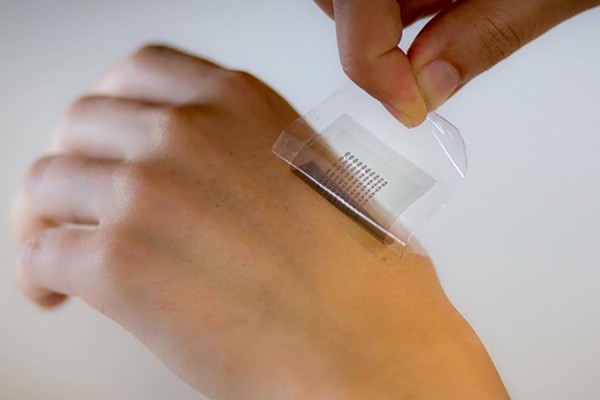 Stretchable transistors allow for functioning wearable electronics, says chemistry professor Simon Rondeau-Gagné.
Stretchable transistors allow for functioning wearable electronics, says chemistry professor Simon Rondeau-Gagné.
A new faculty member in the UWindsor Department of Chemistry and Biochemistry is creating electronic materials that can be stretched without cracking, thus preserving the imbedded transistors, the circuits that turn electrical signals on and off.
Simon Rondeau-Gagné arrived at UWindsor less than a year ago and formed a research team to continue investigating stretchable materials that will aid in the design of the next generation of wearable electronics. He is building on the expertise he gained working with a team led by Zhenan Bao at Stanford University.
The journal Science recently published Dr. Rondeau-Gagné’s article Highly stretchable polymer semiconductor films through the nanoconfinement effect, detailing the development of a skin-like finger-wearable driver that controls light-emitting devices, which can be stretched by 100 per cent without effecting the transistors.
“If you want to design wearables you need to have stretchable transistors, because every time you touch a machine, like your cell phone or computer, every time you ask a machine to do something, it is a transistor that controls the signal,” Rondeau-Gagné says.
These transistors are rigid and cannot tolerate mechanical stress. When stretched, they will crack, stop working, and the machine is broken. For the finger-wearable driver, his team physically blended very stretchable material that protected the transistor by absorbing the stress of the stretch.
Last year, he co-authored an article in the journal Nature, Intrinsically stretchable and healable semiconducting polymer for organic transistors. For that project, instead of physical blending material, Rondeau-Gagné chemically modified a highly efficient polymer containing transistors. This created a material that could be re-healed with heat.
“This chemical enhancement made the polymer softer and gave it healing properties — which is fantastic,” says Rondeau-Gagné. “This is the first time researchers have created a material containing rigid transistors that can be healed; even if it does crack it can be slowly heated up on a hot plate, and the cracks will heal.”
Rondeau-Gagné is currently recruiting graduate students for his UWindsor research team. Potential researchers can find details on the website of his Organic self-healing and stretchable materials research group.
